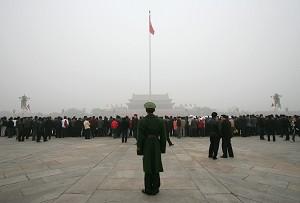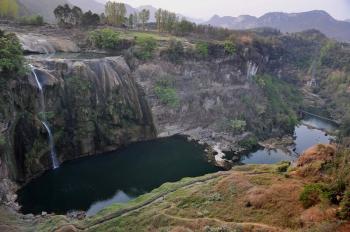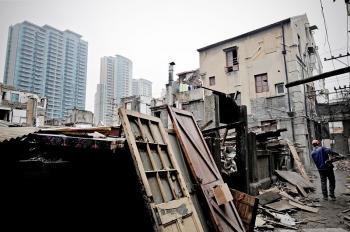Zhou Ruijin, the cheerleader for China’s economic reform and Deng Xiaoping’s tour of the nation’s southern provinces in the early 1990s, has made his voice heard again recently. In a special interview with Southern Metropolitan , he drew domestic and international attention by speaking publicly about the need for political reform in China and by proposing enlarged direct elections and establishment of a supervised and limited (power limited) government.
Not long ago, Yu Keping, a deputy director of the Central Editing and Translation Bureau, who is regarded as one of Hu Jintao’s trusted aids, published an article in Beijing Daily, entitled “Democracy Is a Good Thing,” which was reprinted by The People’s Daily , Xinhua News Agency , and other government media. Due to the backgrounds of Zhou and Yu and to the timing of their article, their words have become a hot topic in China and overseas. People are wondering if these are signs that indicate that Hu Jintao and Wen Jiabao are planning to roll out initiatives for political reforms at the 17th National Congress of the Chinese Communist Party, which is scheduled to take place later in the year.
According to China observers, the struggle for power within the Chinese Communist Party (CCP) has intensified prior to the Party Congress. At present, while Jiang Zemin’s followers—who have suffered successive setbacks recently—are on the defensive, Hu Jintao is still somewhat restrained in the Standing Committee of the Politburo and the military. As both sides are at a standoff, the words of Zhou Ruijin and Yu Keping about political reform and democracy are probably a public opinion card flashed by Hu Jintao, who has been estranged in the internal power fight and who has to appeal to the public for help.
Fierce Power Struggle
The CCP’s 17th National Congress will be held in Beijing in the fall of 2007, and various factions at the top level within the CCP are fighting fiercely for power. Hu Jintao is still being kept in check at the CCP’s top power institution—the Standing Committee of the Politburo. Amongst its members, Wen Jianbao and Wu Guanzheng are Hu’s staunch allies, Jia Qinglin; Huang Ju and Li Changchun are die-hard followers of Jiang Zemin, while Zeng Qinghong, an opportunist, has recently turned his allegiance to Jiang again. Moreover, Hu has not yet fully established his control over the military. Last October, Hu removed the commander-in-chief and political commissar of the Beijing Garrison Force, both of whom were Jiang’s appointees, and filled the posts with his men. Afterwards Hu issued five documents, stressing the absolute control of the party over the army, indicating his concern about the military.
Hu was almost killed in an assassination attempt last May when he was inspecting a naval fleet in the Yellow Sea. After he returned to Beijing, under the pretext of fighting corruption, he moved quickly to clean up the Shanghai gang, including arresting Chen Liangyu, the Party Chief of Shanghai and more than 50 government officials and businessmen. Not long ago, Hu moved again, taking advantage of the social security funds case in Shanghai to remove Huang Ju, a member on the Standing Committee of the Politburo, of his authority on finance matters, spearheading his move directly toward Jiang Zemin and his sons and Jia Qinglin, another politburo standing committee member.
Jiang’s followers have not given up, but instead fought back. The Central Propaganda Department controlled by Li Changchun banned the publication of eight books, openly double-crossing Wen Jiabao, causing a wave of opposition from intellectuals of all schools. Agents from the bureaus of state security and departments of public security, prosecution, and legislation controlled and directed by Zeng Qinghong and Zhou Yongkang have carried on Jiang Zemin’s persecution policy by harassing and sabotaging New Tang Dynasty TV’s global shows and continuing to arrest faith believers. When Hu was on his Africa tour, Zeng Qinghong organized a workshop for some 180 high-level officials and officers from various provinces, cities, and military regions to study the Selected Works of Jiang Zemin and Jiang’s theory of “Three Represents.”
The pro-Jiang officers in the military have recently continued making waves internationally with the aim of damaging Hu’s image. For instance, not long ago, China’s military shot down a satellite with its missiles. The U.S. responded by suspending its space cooperation program with China. Recently Peng Guangqian, one of China’s military strategists, suddenly declared to outsiders that China’s national defense has passed the period of tolerance. On the eve of the forthcoming six-party talks, Teng Jianqun, Beijing’s arms control expert, claimed that, if the dispute caused by North Korea’s nuclear program leads to a war between the U.S. and North Korea, Beijing may step in to help defend North Korea.
So, in the ongoing power struggle at the top level, Hu Jintao is still walking on a tightrope. Seeing he has not gained a clear advantage, Hu started to play the public opinion card by turning to the public for support. Hu took the stance of advancing political reform by letting Zhou Ruijin, a reformist, and Yu Keping, his trusted aid, speak publicly about the need for such reform.
Deng Xiaoping Used for Political Reform
Zhou Ruijin, who publicly appealed for political reform recently, is the mastermind and drafter of a series of commentaries in the early 1990s. At the time he used his pen name “Huang Fuping.” He is considered the mouthpiece of reform-minded high-ranking officials within the CCP. Zhou, now holding the same rank as vice minister, once worked as the editor-in-chief of The Liberation Daily , a newspaper in Shanghai, and deputy editor-in-chief of The People’s Daily , the mouthpiece of the CCP.
In early 1991, The Liberation Daily carried a series of commentaries by Huang Fuping, appealing for deepened reforms, triggering a sharp debate in the ideological circle and paving the way for Deng Xiaoping’s tour of southern China the following year.
Last year Chinese Finance magazine published an article by Huang Fuping, calling on the CCP to follow the model of the Vietnamese communists’ political reform, holding differential elections, meaning that there should be more than one candidate for a given post. The magazine’s editor-in-chief, Hu Shuli, is viewed as a supporter of Hu Jintao and Wen Jiabao. Also not long ago it was the Finance magazine that took the lead in exposing a 70 billion yuan (approximately US$8.7 billion) corruption scandal involving Zeng Qinghong’s son. However, Zhou Ruijin’s recent speech at a forum in China’s southern province of Yunnan was withheld by the Central Propaganda Department, reflecting a chaotic political situation within the CCP where each of the two factions is pulling in a different direction.
This time when Zhou Ruijin called for political reform, he did so under the name of Deng Xiaoping. He said, “I am raising an issue of reforming the political system, and this is derived from Deng Xiaoping’s ideas.” Deng Xiaoping once said that the fundamental weakness of China’s political system was the over concentration of power, and that the party and the government were to be separated.
However, during a special interview last month with Hong Kong newspaper Mingbao Zhou Ruijin also admitted that asking the CCP to “carry out a revolution against itself is easier said than done.”
Note: Deng Xiaoping’s tour of the nation’s southern provinces: In the spring of 1992, Deng, who had already resigned from all formal positions, visited Wuchang, Guangzhou, Shenzhe, Zhuhai and Shanghai. Relying on his prestige, he gave a series of speeches during his tour, emphasizing the importance of the economic development and criticizing those who had doubts about the reform and open policy.




